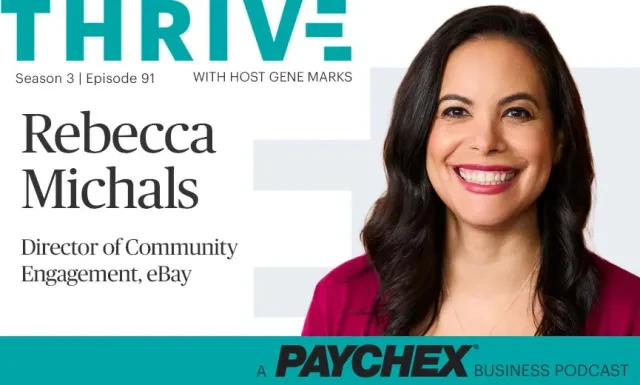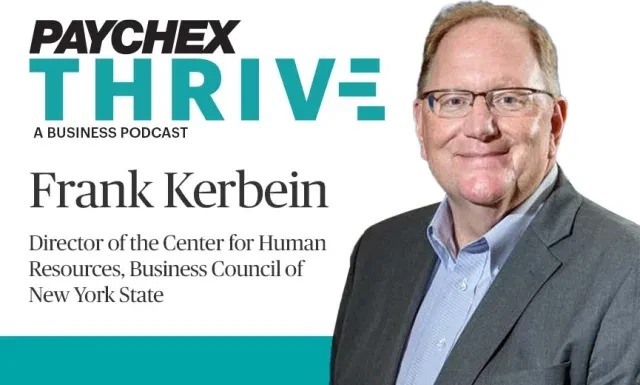¿Qué nos dicen realmente los datos laborales? Consejos para bajar los impuestos. Búsqueda de alimentos para los clientes

Podcast •

Resumen
Despite the growth in jobs and an economy that seems to be moving along steadily, an 8.7 million drop-off in job openings gives Gene Marks some concern. Still, he suggests taking this as an opportunity to set your business apart in the marketplace. He also shares a few tips on how to use write-offs to lower your taxes, as well as adds his reservations on the practice of food digging at restaurants. Listen to the podcast.
Ver transcripción
[Gene Marks, host]
Hey, everybody, it's Gene Marks and welcome to another episode of the Paychex THRIVE Week in Review podcast. This is where we take news that happened during the prior week, and we talk a little bit about how it impacts your small business. So, let's get to it, shall we?
The first has to do with jobs. The government announced last week that new jobs were up about 199,000 in the past month and at the same time the Bureau of Labor Statistics also announced or showed data that show that job openings have decreased by 8.7 million in October.
These are truly conflicting pieces of data. You know, on the one side, the economy's doing well. I mean, the unemployment rate actually dropped to about 3.7%. Jobs that were added in November actually exceeded expectations, which is good news. So, the economy, when you look at it from an unemployment perspective, that is very, very good news.
However, when I see the number of job openings decrease, that obviously is a concern. Most of the job openings that we're seeing around the country are actually from small businesses, a lot of surveys have shown. And the small businesses themselves, like yours and mine, are always looking for good talent. Now, right after the pandemic, job openings were like at an all-time high, like close to 11 million, which means a lot of businesses, both large and small, were desperately looking for employees.
Well, the fact that it's decreased down to 8.7 million tells us that a lot of those job openings have been filled and many have been taken off the market. So that's a concern for, you know, employees looking for a job even though the unemployment numbers are strong. To me, that says the next few months and throughout 2024, there's going to be more challenges for people to find jobs and workers to move from job to job.
And as a business owner, more opportunities. I mean, let's face it, for the past couple of years, we've been the one that's sort of having to catch up with employees because it's been a, you know, an employee market. But that's starting to balance out a little bit more. So, if you're looking for good people, it looks like they're out there. There's less job openings, which is good news, and if you're looking for good people, remember, it's not all about compensation.
Of course, you should be compensated reasonably. But just remember, as a business owner, your workplace, your environment, the chance to get ahead, the chance to grow, the chance to make a difference. These are things that employees are looking for. So, if you're one of those people with an open jobs listing out there, just know there are probably more employees becoming available for these jobs and you can make a really good pitch for why it's so good to work for your business.
Next comes an article that was in Nerdwallet this week about tax write-offs. This article was written by Helen Burnett-Nichols, and she offered five tax write-offs every small business owner should know about, and I strongly recommend that you read it. It's really, really good.
But you know what? I'm a CPA, so I wouldn't mind adding a few write-offs myself, okay, So, listen here. If you're running a business, we're getting near towards the end of the year, couple of things to keep in mind. You know, if you've had a profitable year, instead of giving money to the government in the form of taxes, consider paying more in bonuses to your employees. You might as well do that. It will hopefully help retain them and also maybe attract new workers if they find out that you are a company that pays out year-end bonuses. And if you're only accrual basis of accounting, meaning you're not a cash-basis business, you can actually pay those bonuses as late as March 15 of next year, assuming you’re a calendar year of business, and you can still take the deduction in 2023.
So, pay out some bonuses to your employees instead of paying the government in extra taxes. That's one bit of tax advice. Let me give you another one to complement Helen Burnett-Nichols’ article on Nerdwallet. I would also recommend that if you're running a small business, clean up your balance sheet.
You probably have some old receivables and old inventory on your balance sheet. If it's old and your receivables, you don't think it's going to be collected, or if you've got a piece of old inventory that you just haven't sold – and listen, I know you had great expectations for it, you probably got a great deal, it was probably going to make a mint – but it's still sitting there. Write it off, dispose of it, get rid of that receivable, dispose of that inventory item, and then take the write-off. You can take a tax deduction for doing that.
And finally, when it comes time to saving your taxes, not only should you be maxing out your retirement plans – and that can be any number of retirement plans you might have; a 401(k), a solo IRA or 401(k), an individual IRA, a SEP plan – max them out. Depending on what your situation is, you can put away from anywhere from $6,500 to $22,500 this year to defer your income and reduce your taxes.
But not only should you be doing that, you should also be putting money into a Roth account. Open up a Roth IRA. Better yet, start a Roth 401(k) for your business and contribute to it. It's after-tax money, so you've already paid the taxes on it, but you will it will grow tax-free forever. So, whenever you take the money out, whatever gains it received is tax-free gains. So, it might not save you a whole bunch of taxes this year, but it will definitely save you a lot of taxes in the future.
So, that's some of my tax advice. Read Helen Burnett-Nichols’ article in Nerdwallet and she gives some other tax advice for the year.
Finally, I want to ask you a question. Have you ever heard of food digging before? Hmm, well, there is an article in the star.com this past week that talks about the practice of food digging by restauranteurs and other – maybe you can call them unscrupulous – business owners.
What does it do? Well, what they do is they go after people that are on dating sites like Tinder or Hinge, and they create fake personalities or fake accounts on those sites, and they entice a person looking for a date to go out on a date with this fake item on the site, fake person on the site. And that date, they meet at their restaurant because what they found is if you go out on a date – and guys, by the way, I've been married over 30 years, what do I know? – but apparently, if you go out on a date on one of these sites and the person doesn't show up, there's a high percentage of people that will just stay there and eat anyway.
So, if you're a restauranteur, these people are luring people into their restaurant on the fake premise that there's a date for them, and then when the date doesn't show up, they're making a bet that that person just going to sit there and buy food from them anyway, which a bunch of people actually do.
That's called food digging. It's not illegal. It's not you know, it's not illegal. But is it unethical? Is it immoral? So, a little misleading. Well, that kind of depends. Some of the people that were interviewed in the Star article actually said, “Hey, listen, I'm already there and the food is good, and I’ve got to eat somewhere, so I might as well just eat right there.” They didn't seem to mind it that much, but of course, others felt like they were really being duped.
I kind of think that if you're a restaurant owner, I don't think you want to get into the food digging practice, okay. Don't create fake personalities on a dating site just to get somebody into your restaurant, and then after they're ghosted, you know, taking a, you know, the bet that they're going to eat in your restaurant. I think there's better ways to attract customers to your restaurant, don't you think?
Anyway, that's the news that impacts your business this week. You’ve been listening to Gene Marks and this has been the Paychex Week in review podcast, a THRIVE Podcast. Hopefully, you've gotten good information. If you need any help or would like to suggest a guest for our podcast, please visit us at payx.me/thrivetopics.
Hope you got some good information from this session. We'll be back to you next week with a few items in the news that impact your business and some thoughts on what to do about it. Take care.
Este pódcast es propiedad de Paychex, Inc. 2023. Todos los derechos reservados.

 Apple Podcast
Apple Podcast Spotify
Spotify iHeartRadio
iHeartRadio







